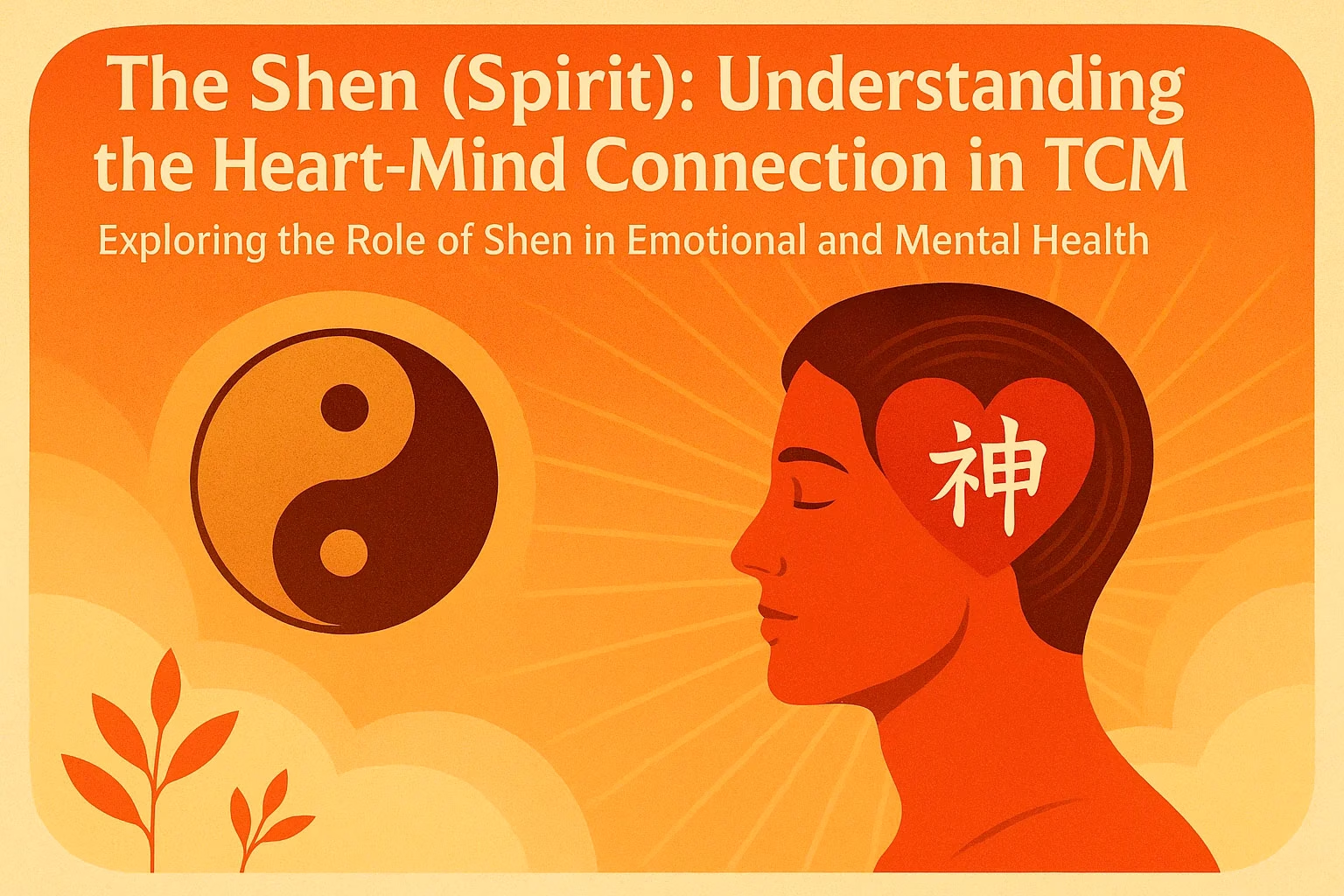Exploring the Role of Shen in Emotional and Mental Health
🔶 Introduction
In Traditional Chinese Medicine (TCM), the concept of Shen (神)—often translated as spirit, mind, or consciousness—is a central element of human health. Far beyond just mental activity, Shen represents the vital force that governs emotions, consciousness, vitality, and presence. TCM views Shen as the manifestation of life itself: when Shen is bright, a person is vibrant, alert, and emotionally balanced; when Shen is disturbed, symptoms such as insomnia, anxiety, confusion, or even psychosis may arise.
This article delves into the meaning of Shen, its residence in the Heart, its relationships with the other Zang organs, and how TCM treats disturbances of Shen to promote mental clarity and emotional well-being.
🔶 What Is Shen in TCM?
Shen is one of the “Three Treasures” of the human body—alongside Jing (Essence) and Qi (Vital Energy)—and reflects a person’s mental and emotional expression, vitality, and presence of spirit.
The Three Aspects of Shen:
- Physiological – It governs consciousness, sleep, and mental faculties.
- Emotional – It regulates how we feel and respond to stimuli.
- Spiritual – It reflects our deeper sense of purpose, identity, and connection.
In practice, Shen is observed through the eyes, facial expression, speech, and mental clarity. A person with healthy Shen has bright eyes, lively gestures, and clear articulation. Conversely, Shen disturbance may appear as dull eyes, emotional instability, or confused thinking.
🔶 The Heart: The Residence of Shen
In TCM, the Heart (Xin, 心) is known as the “House of Shen.” It stores and governs the spirit, making it the core organ for mental and emotional health.
“The Heart governs the blood and houses the Shen.” — Huangdi Neijing
If the Heart is healthy:
- Shen is anchored, calm, and clear.
- Sleep is peaceful, emotions are stable, and cognition is sharp.
If the Heart is imbalanced:
- Shen becomes restless, leading to insomnia, palpitations, dream-disturbed sleep, anxiety, or mania.
Because the Heart also governs Blood, a healthy flow of Heart Blood is essential to nourish Shen. Blood deficiency, especially from emotional strain or overwork, can lead to Shen disturbance.
🔶 How Other Organs Affect Shen
Although the Heart is the primary residence of Shen, TCM recognizes that the five Zang organs each influence different aspects of mental and emotional activity:
| Organ | Role in Mental Function | Related Emotion |
|---|---|---|
| Heart | Houses Shen (consciousness, mental clarity) | Joy (or excess excitement) |
| Liver | Regulates the free flow of Qi and emotions | Anger, frustration |
| Spleen | Generates Blood to nourish Shen | Overthinking, worry |
| Lung | Governs Po (corporeal soul, instinctive response) | Grief, sadness |
| Kidney | Stores Jing, foundation of Shen | Fear, insecurity |
This systemic approach explains why emotional and mental disturbances are often treated holistically in TCM, rather than focusing only on the brain or nervous system.
🔶 Common Shen Disorders in TCM
When Shen is disturbed, it manifests in a variety of ways, depending on the pattern of imbalance:
1. Heart Yin Deficiency
- Shen lacks anchoring due to insufficient Yin and Blood.
- Symptoms: Insomnia, restlessness, vivid dreams, dry mouth, palpitations.
2. Heart Fire Rising
- Excessive emotional stress or diet leads to internal heat disturbing the Shen.
- Symptoms: Irritability, anxiety, red tongue tip, ulcers, insomnia.
3. Phlegm Misting the Mind
- Phlegm obstructs the orifices, disrupting Shen’s clarity.
- Symptoms: Mental confusion, clouded consciousness, possible mania or withdrawal.
4. Liver Qi Stagnation affecting Shen
- Emotional stress causes Qi to stagnate, impacting the Heart.
- Symptoms: Depression, mood swings, sighing, irritability.
🔶 TCM Approaches to Nourishing and Calming Shen
✅ Herbal Medicine
TCM uses a range of herbal formulas to nourish the Heart, calm the mind, and anchor the Shen:
- Suan Zao Ren Tang (Sour Jujube Decoction): For Heart Yin and Blood deficiency.
- Tian Wang Bu Xin Dan: Nourishes Heart and Kidney Yin, calms Shen in cases of chronic insomnia and anxiety.
- Wen Dan Tang: Clears phlegm-heat disturbing the Shen, helpful for anxiety with digestive symptoms.
✅ Acupuncture
Key points that help regulate Shen:
- HT7 (Shenmen) – Calms the mind, nourishes Heart Blood.
- PC6 (Neiguan) – Regulates the Heart, opens the chest, soothes anxiety.
- GV20 (Baihui) – Lifts and stabilizes Shen, clears mind.
- Yintang – Between the brows, used to calm and center the spirit.
✅ Lifestyle and Shen Cultivation
- Mindfulness and meditation: Calm the Shen, reduce Liver Qi stagnation.
- Adequate sleep and rest: Essential to regenerate Blood and Yin.
- Emotional expression and journaling: Help move Qi and prevent stagnation.
🔶 Conclusion
In TCM, Shen is life itself—it animates the body, governs emotion, and expresses consciousness. Its well-being depends on the nourishment of Blood, anchoring by Yin, and the harmony of the Zang organs. Through a combination of herbal medicine, acupuncture, emotional regulation, and lifestyle balance, TCM provides a comprehensive framework for supporting mental clarity, emotional resilience, and spiritual vitality.
When the Shen is calm, the body is at peace.
When the Shen is disturbed, all systems suffer.


发表回复